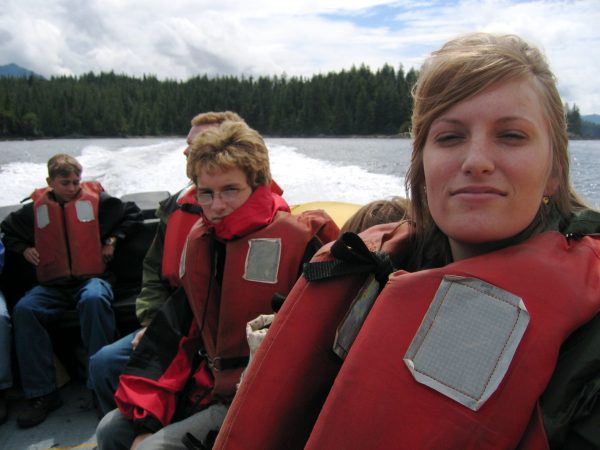Enjoy more of our altruistic live wire!
Me: Okay. What do you think about your critics, specifically Aroup Chatterjie who felt you promoted a negative image of Calcutta, and he also claimed you were not a significant entity in Calcutta in your lifetime. He felt you misused funds and privileges at your disposal. Is that true, and is there a spiritual reason for that criticism to happen?
Mother Teresa: I understand where the criticism was coming from. I ran my operations very simply. I’m remembering that a lot of people would complain that I wouldn’t administer more medication, more antibiotics or pain medication, ointments, things of this nature to the person who was suffering or hurting.
(Pause)
Jamie: All right. She’s going to go back to talking to Erik. It goes smoother that way.
Me: Yes, I can see that.
Erik: A lot of people considered her a bit of an abuser, that she would let people suffer and not take care of them, but she would say, “Who am I to take away someone’s suffering?” She was not in God’s place.
Mother Teresa: If this person was going through suffering in this life, then that was part of what they came to learn, and I was helping house that in a very clean and safe environment. That is what I provided.
“Then why feed or educate or clothe or help anyone?” I think.
Mother Teresa: All modern people, especially western people, felt that this was very much an abusive situation. I could never see clearly why they wanted to attack me in this way. I did God’s work and these people, beyond their death, would never say they were abused. We sat with them; we loved them; we held their hands and gave comfort as they were suffering. This is God’s lesson—that suffering is just as important as love. The misuse of the funds—I disagree with that. I was not attracted to money or awards. There was a time when –
Jamie (to Mother Teresa): So, award money? She won an award and got paid for it. Award money was coming in, and she wasn’t the one who would go to the bank and decide what to spend it on. There was a system in place.
Mother Teresa: So, I felt I had good people in place. A person’s character can always lay judgment to anyone. I’m only one person; I could not have managed every single penny that came in. It was only afterwards that I was aware that some of the funds were going to causes that were not useful such as purchases for the ease of life for the nuns instead of the money going directly to the poor. More was spent on travel that I expected, but this was not something I dictated to happen. For that, I apologize for not being a better businesswoman
Mother Teresa (to Erik): I didn’t come to Earth to become a businesswoman. I came to be a mother to those who had none.
Me: Well put. Let’s talk more about your view on suffering. You felt that suffering would bring people closer to Jesus, Of course, as you mentioned, you were criticized for your failure to administer painkiller. On gentleman said people should hear the screams of patients as maggots were being tweezed from their open wounds without pain relief, but you thought it was the most beautiful thing for a person to participate in the suffering of Christ. Is that what you feel—that it’s akin to participating in the suffering of Christ?
Jamie: I need to stop making facial expressions, though I didn’t know I was doing them. I need to remain neutral.
Me: Yeah, the whole maggot thing turned you off. You didn’t eat breakfast yet, Erik?
Erik: No, I was thinking about frying a few maggots and dipping them in chocolate and having them later.
Me: Yuck. Erik!
Erik: You know those fat ones—
Jamie (to Erik, clapping her hands really fast): Stop! Stop, stop, stop. Don’t go on. Ew. I just had a little gag in my throat.
Me: I don’t do maggots.
We both giggle. Jamie covers her mouth with her scarf.
Jamie: Okay, new visual. New visual. (to Mother Teresa) Yes, please start talking.
Mother Teresa: I do believe there is a holiness in suffering, that people easily pacify their pain to become what they consider in a joyful state that would be more healthful. I very much disagree with this (criticism.)
Jamie: This is the strongest I’ve heard her voice. It’s very cutting. (Jamie imitates by repeating her words in a loud staccato rhythm.)
Mother Teresa: It is important, if there is pain, to feel the pain so that you may be able to learn from it, love it, embrace it, and, yes, it is the suffering that pulls us closer to Jesus and God. It is the love that embraces us to extend beyond Jesus and God.
Two things became clear to me in her answers to these last two questions. People expected way too much of Mother Teresa considering what little she had to work with, and she had a keen understanding of how important duality is in the human experience. Suffering, whether slight or extreme, is necessary to true understand unconditional love.
Jamie: That came with a really cool visual, actually. It’s interesting to hear the words like that, though, right?
Me: Mm hm!
Jamie: For me!
Mother Teresa: But it’s firmly what I believe, and I know many people disagree. In my passing, I still continue to do this work on Earth helping others who walk this path, but I also have made connections with those I have helped after they passed away to finish the work I did when they were was living—helping them in and helping them cleanse their life and become who they desire to be. I will never direct a person to a certain religion. It is not my job. It is for me to walk my own belief in hopes that others could see the joy, love and centerness I have gained from it and maybe they would choose to follow me.
Jamie: So, even in the afterlife, she’s not trying to get people to convert or have a different belief system or live life differently, but support them for who they are and who they want to be.
Me: Okay.
Jamie: Her principles are very fixed. She knows who she is! She knows what she’s going to do. There’s no gray line in this woman.
Me: Absolutely not, and I think this interview is rally important, Mother Teresa, because you have a chance to show the world what your really feel and give a rebuttal to some of the criticism that’s been levied against you. You’ve been criticized a lot!
Mother Teresa: Yes, but I still feel no need to defend myself against other people’s opinions. It is a waste of time. My true voice and my honesty won’t change what somebody else believes in about me. They’ll have to discover that on their own. That’s why I chose not to fight back when I was living. My time was better spent caring for those who needed me, not for those who did not want me. This is a lesson I would love for everyone to learn.
Jamie (chuckling): She’s just going into telling Erik that there was one thing she wanted anyone who had interacted with her, worked for her, knew her, saw her, read about her or even through stories would gather that the most important action that you could do or provide for yourself is to give love to your family. Family values. Work hard on those, because—
(Pause)
Jamie: Oh, I misunderstood her.
Mother Teresa: If everyone did this work, then the world would change immediately.
Me: Love your family. Is that what you’re saying?
Mother Teresa (with a strong voice): Yes.
Me: Good.
Jamie: You would think that pint-size little thing would have such a little—
We both chuckle.
Me: Little spitfire, like I said! You were also criticized for the quality of care you offered to the terminally ill patients in your Home for the Dying, and this was reported in the medical press, including The Lancet and The British Medical Journal. They reported the reuse of hypodermic needles, the poor living conditions like cold baths for all of the patients, the hazardous medical care—they say that often, your Order did not distinguish between curable and incurable patients, so that people could otherwise not survive without the risk of dying from infections and lack of treatment. So, they basically said there was a lot of problems with your medical care and to the expressed needs and wishes of the patients.
Mother Teresa: I never claimed to be a medical hospital. Mine was a place where people came in to die, and I wanted to help them. I recall all of these examinations and appearances at many of my centers, and I told them to gather the money together, and I’ll put together what they were suggesting. But often you can only do with what you have. I could not create money, and I was not going to sell my soul. The good thing with that publicity was that people saw how bad it was, and the people who still believed in my work gave more. Those who did not believe in giving to the poor were good enough to turn and walk away from me, so it did me good in all ways.
Me: Okay.



